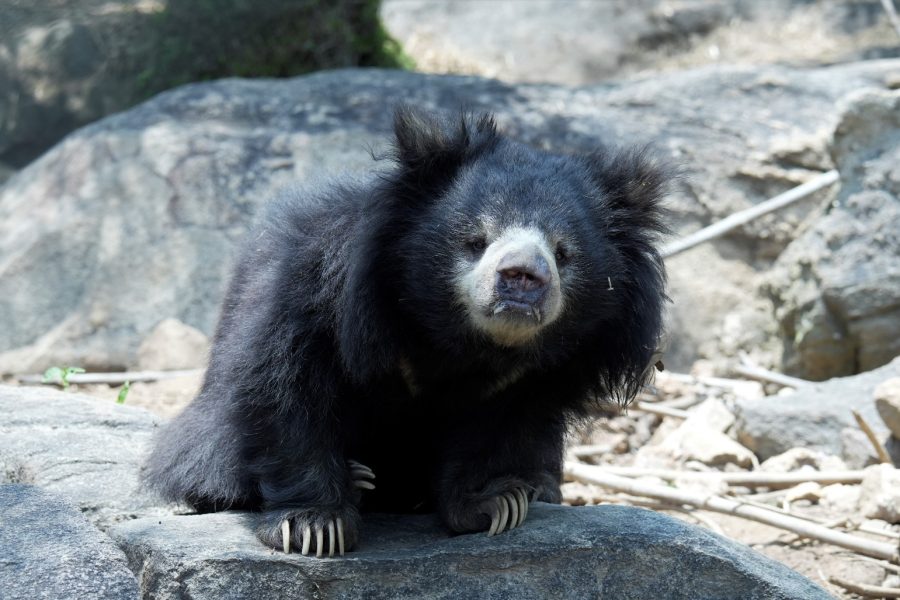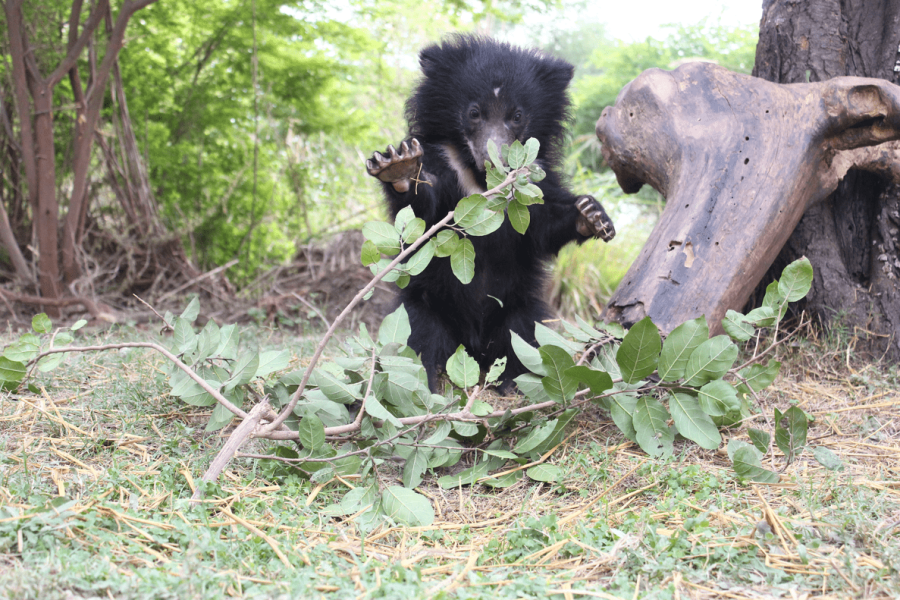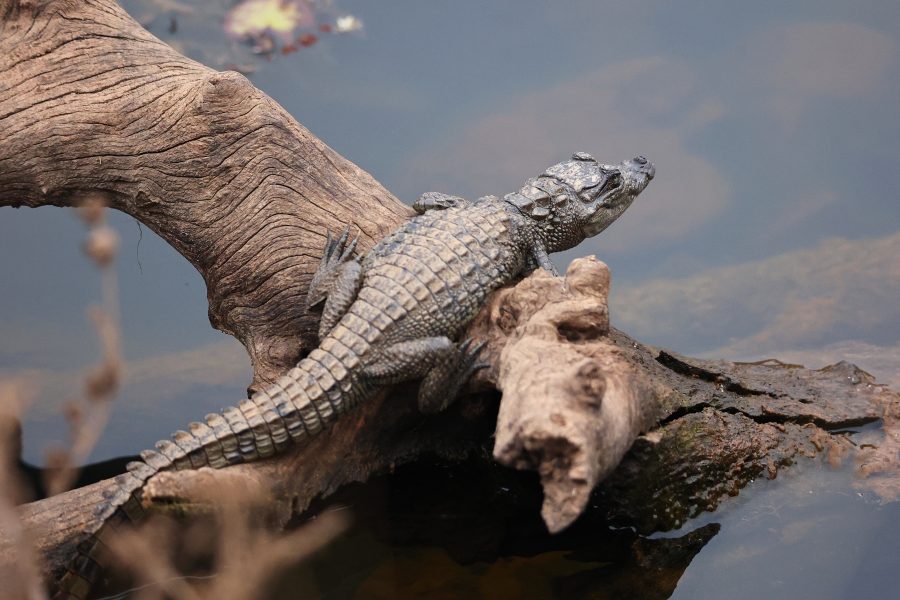The Wildlife SOS at Fatehpur Sikri strives to save the bears from captivity and give them a habitat they rightfully deserve.

India is known world-wide for its snake charmors, monkey performances and elephant rides. The dancing bear surprisingly, does not catch the stereotype makers’ fancy. As kids, we have all seen the bhallu wallah antics. I remember being fascinated by the giant bears, wondering why they didn’t just pounce on their trainer for the indignity they were suffering, the silly tricks they were forced to perform even though they were so much bigger than the man holding the rope.
Only as an adult did I learn that these bears have been conditioned to be docile in the inhuman of ways. The horror was unfolded in its gore and blood avatar when I recently came across a bunch of people, actually an NGO called Wildlife SOS, who have dedicated their lives to looking after these bears after rescuing them from their handlers.
Contrary to what I’d thought, it’s not entirely the handler’s fault. My personal solution to the problem bordered on reprimanding the kalandar (the handler) and giving him no cash. Today, I admit guiltily that this was an ineffective step. Sadly, poaching these sloth bears and making them dance to their damroo is the only source of livelihood for these handlers, who hail from the nearby tribal belt. WildlifeSOS has done a remarkable job of rescuing these bears on the Agra Fatehpur Sikri stretch and rehabilitating them at their sanctuary in Agra. That they’ve been quite successful can be gauged by the fact that the number of sloth bears dotting the road with their masters, looking for business from passing vehicles, seems to have gone down drastically. But the beauty of it all is that WildlifeSOS has not only saved these animals from cruelty, they’ve also provided their handlers gainful employment This is as crucial as rescuing the animals because only by providing them alternative means of income can one deter future poaching.
Silent Woes
Situated in a bird sanctuary, within an army unit on Mathura-Agra road, one needs permission to enter. Tranquility prevails and rescued peacocks, pigeons and wild squirrels live alongside the bears. Guna, Ramu. Bhoop Singh. Vishnu, Jasmine, Santa – these are not just names given to the bears by the erstwhile handlers or kalandars. These bears have personalities and they have stories that are sufficient to give any sensitive person sleepless nights. As cubs, they were poached to different handlers, subjected to a cruel form of conditioning and taming, which includes having their canines and claws sawed off. muzzle pierced with a red hot iron (to thread the rope that keeps them under control) and castration. Later, the cubs are made to stand on a bed of hot coals while the domroo is played at the back. This disturbing pavlovian conditioning is what makes them tap their feet when the kalandar beats his drum.
After rescuing them, WildlifeSOS asked the same trainers/handlers to be their caretakers in the sanctuary. This is a fascinating reversal of roles. Earlier, the bears would work for the kalandar’s bread and butter. Now at the sanctuary, it’s the opposite. The bears have recovered, but the indignity, pain and suffering have left deep scars. Today, their handlers (WildlifeSOS) understand and appreciate their individualistic likes and dislikes.
While you and I will not be able to differentiate one bear from the other, their handlers, the vets and those who feed them, know these bears like we know our friends. The people who guide you through the secure sanctuary will tell you how each bear was rescued, how they were miserable through their quarantine period, or how the vets had to remove tumours caused by improper and cruel removal of the canines.
The handlers will also tell you that it took a long time for the bears to get used to human kindness. How some of them have become blind due to malnutrition, how an agitated bear unable to yet trust human beings is in turn kind to her blind mates and how some bears will only eat what they demand!
Efforts Bear Fruit
The sanctuary in Agra contains the largest number of sloth bears in the world. Even then, this is not a job for the weak-hearted, or someone looking to do a little time with an NGO. There’s little glamour, even less money and no words of appreciation by your employers. For really, your job is with the bears.

Prema Sharma. Feeding and Enrichment Coordinator, is a young girl from Bhopal and is extremely comfortable with the bears. She knows their stories, their quirks and diet preferences. Understandably then, she was genuinely horrified when asked if the Rescue Centre could be opened to the public. “Seeing new people around them will only result in further trauma for these bears. Earning their trust after the ordeal they’ve been through is a task by itself. Opening it to public would defeat the purpose of keeping them here!” she says.
As I found out, nobody here holds a grudge against the kalandars. Prema says the men who capture these bears and make them do these tricks are in a pathetic situation themselves. “Usually, these bears remain with one handler for about four months, in which time he earns for the whole year. Then he loans the bear to another handler who does the same and so on….Hence rescuing one bear results in unemployment for many handlers.”Prema adds.
Kartick, who works at their Delhi office, talks about more hurdles in rescuing the bears, “After sensitising the public about protecting nature, we have to work on generating financial resources to take care of the projects. Government bureaucracy is an additional challenge. Our initiative to ensure alternative livelihoods for the tribal communities was met with some resistance from the community. However, now it has been widely accepted and proven successful.* Yet public and government apathy as well as the lack of funds remain a problem.
Despite their best efforts, in UP, Bihar, Jharkhand and Karnataka, you can still find dancing bears and their handlers. WildlifeSOS hopes to rescue every last bear in India. Even though the organisation does not have a lot of money, the individuals who run the place want to make a difference to the planet, nature and wildlife. That’s the most striking aspect about them. M of us may not be able to leave our cushy jobs and get down to bear-caring but we can still contribute in many ways. WildlifeSOS welcomes all contribution, monetary or otherwise…

Situated in a bird sanctuary, within an army unit, tranquility prevails in this bear rehab where rescued peacocks, pigeons and wild squirrels live alongside the bears
Supporting the Kalandar
For any evil practice to be eradicated, all loopholes must be plugged and human factor taken into account. Rationally, a law is in place to punish the violators. The poachers steal cubs and kill mama bears because there is a demand; and there is demand because the kalandar community does not know any other way to earn their bread and butter. The chain is best broken by killing the demand which is possible only when you give them an alternative and a dignified occupation.
Some kalandars have surrendered their bears peacefully when offered an alternative source of income. In Bhopal, women have been helped by training them in sewing and other crafts. Realty, women like Salma Bai are happy that her children are going to the village school. WildlifeSOS has sponsored her son, who gets good grades. For the first time, a helping hand has been extended to the community. Today, over 60 children have been sponsored with the help of The Ford Foundation. I met five young boys of the kalandar community, who somberly posed for a picture. They have changed and adopted a new lifestyle, sometimes turning helpers at the facility rather than the undignified and glorified beggars who used the bear’s misery to eke out a miserable living. ***





